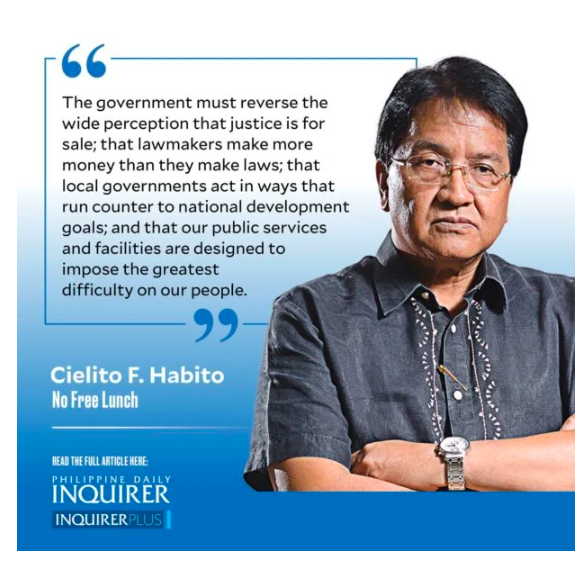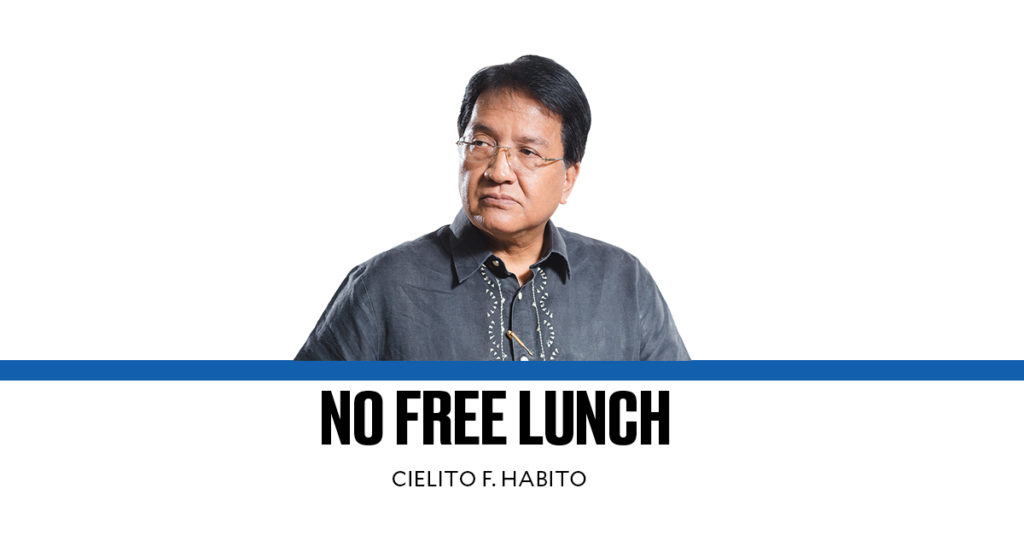
To those who will become our next leaders, I would like to humbly suggest a governance agenda summed up in seven words/phrases that begin with the letter I, which I believe round up what our nation needs if we are to truly uplift lives inclusively and sustainably:
Integrity, to me, is foremost. Filipinos need a government that is transparent and accountable to the people, especially after a substantial fall in our international rankings on public sector corruption over the last six years. Last year, we continued falling to what Transparency International calls a historic low for the Philippines, with a score of 33 on a scale of 100, and ranking 117th out of 180 countries rated. We have dropped 32 ranks since our record best performance of 85th posted in 2014. We need to stop public funds from flowing into the wrong pockets, hold high officials accountable for their actions, and raise business confidence to attract far more job-creating investments.
Institutions, including those that should be the recourse of the most disadvantaged among us, have been severely damaged over many years of bad governance, and need to be repaired, restored, and strengthened. The government must reverse the wide perception that justice is for sale; that lawmakers make more money than they make laws; that local governments act in ways that run counter to national development goals; and that our public services and facilities are designed to impose the greatest difficulty on our people. We must fundamentally restructure our institutions, including merge-related ones (like putting transportation and public works together), and create new ones to meet priority needs (like a Department of Fisheries).
Inclusion is about ensuring that development uplifts the lives of all Filipinos in the economic, social, and environmental dimensions, and that poverty is reduced especially in the countryside. The COVID-19 pandemic has significantly raised poverty incidence anew and the economy’s recovery still benefits a narrow few. We need to find ways for small farms and firms to participate more actively in and benefit from the resumption of economic growth, and generate enough quality jobs to bring decent work and ample incomes to our workers right here at home, without having to go overseas.
International relations assume greater importance amidst escalating threats to our territorial sovereignty, while the region moves toward stronger economic integration. We need to pursue diplomacy beyond politics and highlight the crucial importance of economic diplomacy in a globalized economy where economic interdependencies across borders have become critical to inclusive development and poverty reduction.
Investments, whether domestic, foreign, private, or public, have persistently been far too inadequate to generate productive and remunerative jobs that would make foreign employment a choice, not a necessity, for Filipino workers. We need far greater investments in agriculture/agribusiness, manufacturing, and tourism to create the jobs that millions of our unemployed best fit in. For greater competition and less concentrated economic power, we need to open up our long-outdated constitutional restrictions on foreign investments in public utilities, mass media, advertising, and education.
Infrastructure has received priority in the current government, but we continue to suffer from its persistent inadequacies on a daily basis, be it in badly congested traffic, unreliable and costly electric power, inadequate water and sanitation facilities, or slow internet speeds. Public-private partnerships are essential to accelerating the “Build, Build, Build” program to overcome weak absorptive capacity in our main infrastructure agencies.
Finally, and certainly not least importantly, intergenerational welfare must be an underlying concern in all our development efforts. Our decisions and actions today must not compromise the welfare of our children and generations of Filipinos yet to come. We must keep in step with the world community in the pursuit of the United Nations’ Sustainable Development Goals by 2030 to ensure a better world for all of humanity, now and in the future.
cielito.habito@gmail.com
